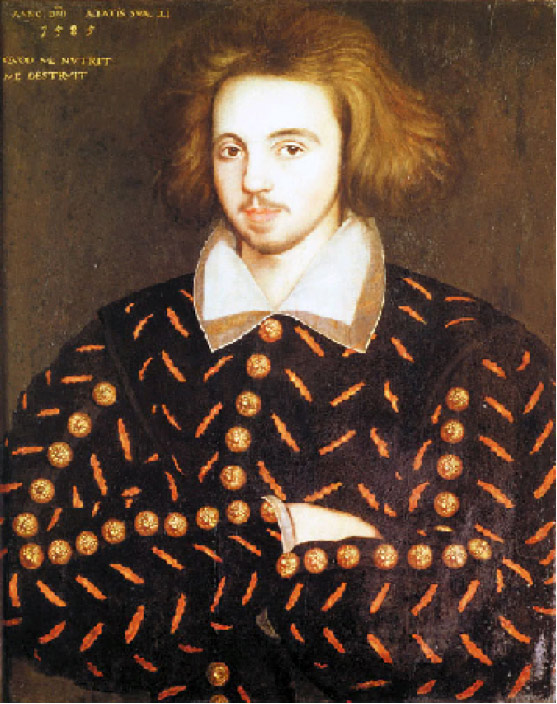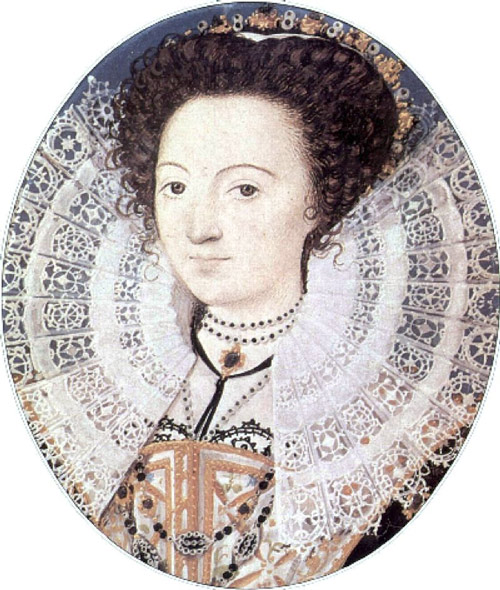wcag heading
It strikes a man more dead than a great reckoning in a little room.
William Shakespeare (Epigraph, A Great Reckoning)
 The Shakespeare quote comes from the comedic play, As You Like It (Act III, Scene III), and is believed to have been written in 1599. The line is a direct reference to Christopher Marlowe’s death which occurred six years earlier under extremely suspicious circumstances.
The Shakespeare quote comes from the comedic play, As You Like It (Act III, Scene III), and is believed to have been written in 1599. The line is a direct reference to Christopher Marlowe’s death which occurred six years earlier under extremely suspicious circumstances.
Marlowe, a mercurial figure in Elizabethan England, was a rumored spy, a possible heretic, a poet, and, above all, the greatest playwright of his era, up until his untimely death at the age of 29, when Shakespeare would assume the mantle.
The “reckoning” that led to Marlowe being stabbed to death was purportedly over an unpaid bill, although the man who wielded the dagger, Ingram Frizer, was—like Marlowe—linked to espionage and the motive for murder was perhaps more political than pound sterling based.
So great was Marlowe’s influence on the Bard that there are theories that Marlowe was indeed Shakespeare himself. For over 400 years, the question of “did Shakespeare actually pen the plays attributed to him?” has loomed large. Marlowe is but one of the possible candidates. Others include Francis Bacon, Edward de Vere, Sir Walter Raleigh, and—the most curious of all in my opinion—Amelia Bassano Lanyer.
 Lanyer (1569-1645) was one of the first women in England to publish her own poetry and to operate her own school. She is also credited as a pioneer of the feminist movement. In short, Amelia Bassano Lanyer was smart, unique, and strong-willed.
Lanyer (1569-1645) was one of the first women in England to publish her own poetry and to operate her own school. She is also credited as a pioneer of the feminist movement. In short, Amelia Bassano Lanyer was smart, unique, and strong-willed.
Enter (Stage Left) Louise’s character, Amelia Choquet.
Amelia, as introduced in A Great Reckoning, is certainly unique, classically smart, and exceptionally strong-willed.
And, the name Amelia has a singular importance in Armand Gamache’s familial history.
“Armand Gamache sat in the little room and closed the dossier with care, squeezing it shut, trapping the words inside.”
And so begins the 12th novel in the Three Pines canon and, for those of you who have read it, you know that the book contains a major settling of accounts, a great reckoning, if you will.


24 replies on “CULTURAL INSPIRATIONS FROM THREE PINES: A GREAT RECKONING”
Definitely read them in order. The character’s develop – especially the time they spend in Three Pines and how they all grow to know and care about each other -and how Jean Guy originally hates going there ……… they really do flow into each other – what Louise teaches you just grows by each book as do the characters as they grow and develop with everything they go through – if you don’t know about “the factory incident” you can’t understand the relationships that Armand has with Jean Guy, Isabel, Myrna, etc.
[…] This week’s installment of “Gamache Goes Abroad” leads us across the Atlantic to the United Kingdom for A Great Reckoning — which is perfect, because the title comes from William Shakespeare’s “As You Like It.” […]
Still reading A Great Reckoning. Getting into naming the group of Sûreté cadets… cacophony of cadets seems appropriate. Love the depth of characters and themes in Louise Penny’s series! Thank you!
Re reading all Louise Penny’s books from the beginning: I began with The Beautiful Mystery, which I loved, but realized that my enjoyment would be so much greater if I had read them in order. References to prior settings, characters, problems, etc. are better understood.
I just picked up this paper bag entitled A GREAT RECKONING” I read the Shakespeare quote and out of habit I Googled it and I have all this information. I had no idea there were discussions. This is so wonderful. Is it necessary to read all the books starting from the beginning?
You can jump right in anywhere, David. Enjoy!
Paul Hochman’s blog at the top of the page is plagiarized from this 2012 blog by Jamie Rawson: history-day-by-day/2012/05/30/a-great-reckoning-in-a-little-room/
No credit is given to Rawson, though Rawson does cite his own sources.
For shame! If you did that in one of my classes, I’d flunk you.
You’re a troll, Ed Christian. Move along.
Who planted the “current” three pines? The three young boys before WWI (A Great Reckoning) or Timmer Hadley after WWII (Still Life)?
BTW, like everything else about Marlowe, there is a mystery about the painting at the top of the page. While it is always used as a portrait of Marlowe, there is no direct proof that is one. In fact, it is an intriguing mystery in itself.
Indeed, Doug.
Laurie, you expressed much of what I feel when reading Louise’s books and also “becoming friends with death.” Her books create very real images of place and person. More than that, through Gamache and the villagers we learn about the profound depths and range of the human character, friendship, emotion, and spirit. Louise and her characters are a part of me, truly friends. As many of her readers express, rereading her books continues to enlighten us. I am amazed at the research and references she uses in each one! And bless you, Paul! You enrich us still further.
Thank you, Nancee!
So many things came together in this book. I am rereading the series. I’ve read posts by others about the experience for them. Finding clues for coming stories in very early books has been my surprise. I wonder how much of this Louise “knew”? Did she have the bigger picture from the start? The wisdom of The Cultural Inspirations has broadened my pleasure so much. Look forward to the Inspirations for Glass Houses! Thank you, Paul for your series, and the wisdom o.f your words.
My pleasure, Bettie!
I so admire Louise’s ability to paint pictures with words. The way she described the light coming through the glass in the monastery. Squeezing the dossier shut, trapping the words inside. I can just visualize the words trying to escape. So many others. Such a joy to read her books.
Enjoy knowing more details of historical background. It’s been a long year, very impatiently waiting (not much longer)!
I loved this book, given its reckoning with several characters appearing in others of the series and the idea of forgiveness, and completion of the arc. I just happen to be watching a series on TV about Will Shakespeare in his early days and Marlowe is a prominent character there. I have thought it was over the top…but now I have to revise my opinion. These cultural discussions always deepen my understanding of the books and make me want to reread the series. Awaiting Glass Houses impatiently. sigh.
A person necessarily help tto make critically posts I’d state.
Thiis is the very first time I frequented your
website page and thus far? I amazed with the research
yyou made to create this particular post
extraordinary. Great activity!
My novel DARK LADY tells the story of Emilia (also spelled Aemilia and Amelia) Bassano Lanyer and her relationship with Shakespeare. It’s fiction, but based on historical research, and nothing happens that couldn’t have. I’m so glad you know about her. I also love Christopher Marlowe (my master’s thesis was on him), and he is a character in DL.
Penny writes with the full spectrum of human experience. There is despair and grief and hope and empathy in each novel, and the character of Gamache is the lens and the light that both entertains and teaches us. Bravo to the author!
This book reminded me that the great griefs of our lives cannot be avoided or put aside. This is as true of the deaths of loved ones as it is of the death of long friendships. We may believe we have dealt with these griefs when all we have done is to simply live through them–admirable, of course, but not sustainable. Sooner or later, that grief will come roaring back. Decades ago, I took a course entitled “Death and Dying” taught by a recovering alcoholic who drank to obliterate the greatest of griefs: the death of his child from SIDS. He told us to “make friends with death,” because we would all encounter it so many times before our own deaths. The lesson I took away was that there is no way around the obstacle of death or other griefs. The only way out is THROUGH. Gamache is surrounded by death and his great compassion for others means that he can never become hardened to it, so he has chosen a difficult profession. Gamache also has to deal with the betrayal of friends. I particularly love the books which give us more background on Gamache, Reine-Marie, and Beauvoir. So looking forward to “Glass Houses.”
Thank you, Laurie, for your wise and beautifully written comments on death and dying. I walk through grief at every funeral I attend, and while I don’t like the pain they cause, I know I am stronger because of it.
Thank you for this background information! It enriches an already captivating novel!